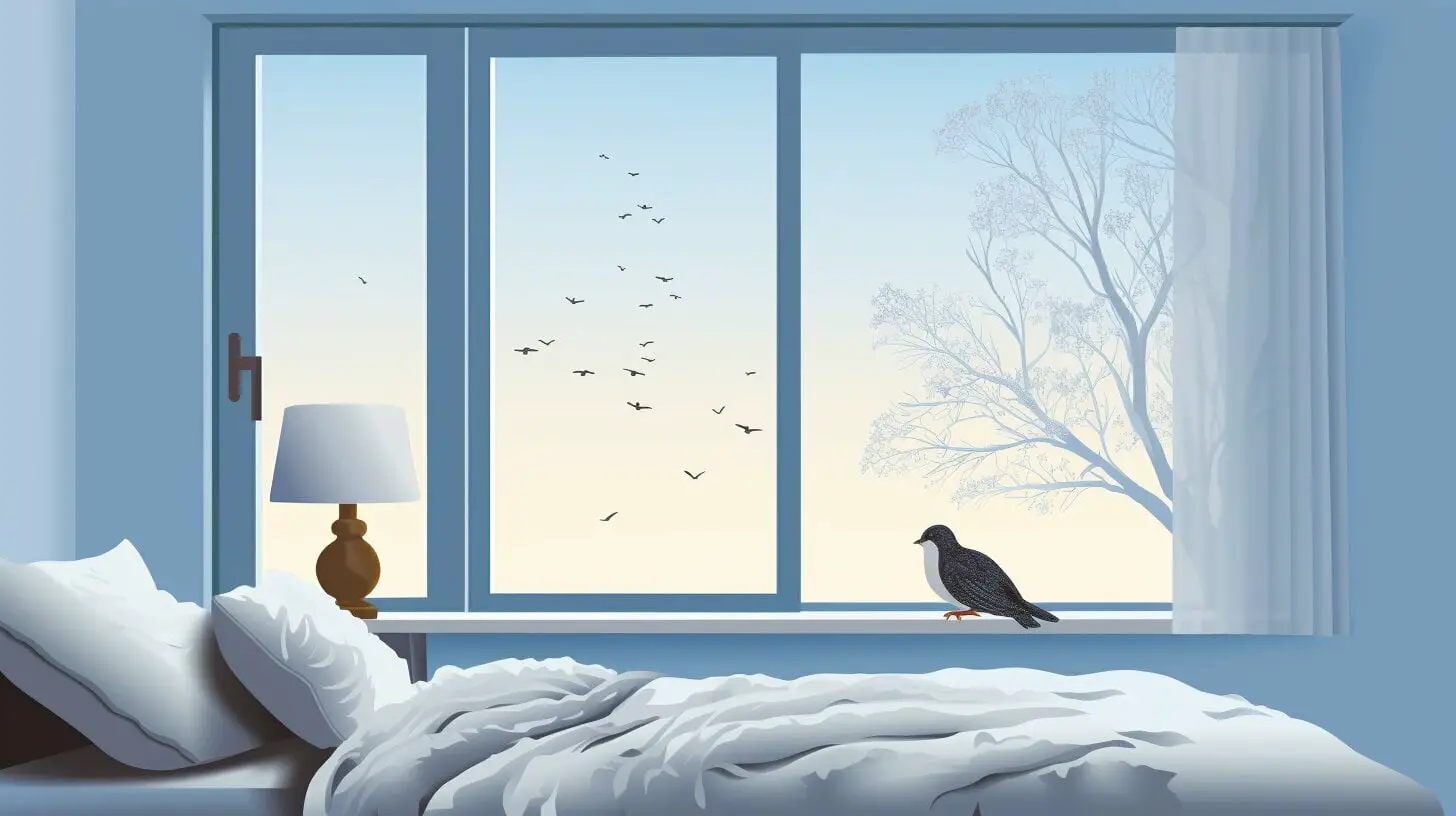Do you find it difficult to fall asleep due to the incessant chirping of birds at night? Excessive bird noise can be a major disturbance for people living in urban areas, affecting their quality of life and overall well-being. However, you don’t have to resign yourself to a sleepless night. There are various techniques that you can use to minimize bird chirping and create a quiet and peaceful environment for better sleep.
Key Takeaways
- Excessive bird chirping at night can be a major disturbance for people living in urban areas, affecting their quality of life and well-being
- There are several techniques that can be used to minimize bird chirping and create a quiet and peaceful environment for better sleep
Understanding Nocturnal Bird Behavior
If you’re struggling with birds chirping at night, it’s important to understand why they are doing it. Nocturnal bird behavior can be influenced by a variety of factors. For some birds, it is simply a part of their natural circadian rhythm to be more active at night.
Other factors that may contribute to nighttime bird chirping include light pollution, changes in temperature, and mating season. Birds may also be attracted to certain sounds or patterns, such as the hum of electrical equipment or the flicker of a nearby television.
How Birds Communicate at Night
Birds use a variety of methods to communicate at night, including vocalizations, body language, and visual cues. Some species of birds are particularly vocal at night, producing songs, calls, and other sounds to communicate with members of their own species.
Other birds rely on body language or visual cues to communicate with one another. For example, owls use their large, expressive eyes to send signals to other owls in the area, while some nocturnal birds use reflective feathers or other visual cues to attract a mate.
Controlling Bird Chirping in the Evening
While it may not be possible to completely eliminate nighttime bird sounds, there are several bird noise reduction techniques that can be employed to control bird chirping in the evening. Understanding the behavior of nocturnal birds is the first step in developing effective strategies for reducing bird noise.
By adjusting outdoor lighting, implementing bird-friendly deterrents, and utilizing soundproofing techniques indoors, it is possible to create a more peaceful environment that is less prone to bird chirping. Additionally, incorporating white noise or soothing sounds can help to mask bird sounds and promote better sleep.
If all else fails, seeking professional help may be necessary to deal with excessive bird chirping at night. By taking steps to maintain a bird-friendly environment and implementing effective bird noise reduction techniques, it is possible to sustain a peaceful night’s sleep despite the presence of chirping birds in your surroundings.
Environmental Approaches to Reduce Bird Chirping
When it comes to controlling bird chirping in the evening, implementing natural and environmentally-friendly techniques can be effective. Here are some solutions to try:
1. Install bird feeders away from sleeping areas
Feeding birds is a great way to appreciate them, but it can also attract them to your property. To prevent birds from gathering near your bedroom window, place bird feeders away from sleeping areas and clean them frequently to avoid leftover seed accumulation.
2. Enhance your landscaping
By planting bird-friendly vegetation, you can create a more natural habitat that birds will prefer over your house. Consider native plants that will attract birds and provide cover and food sources. Avoid trees with berries or fruits that remain on the branches throughout the winter, as these may attract birds looking for late-night snacks.
3. Use reflective surfaces or predator decoys
Installing reflective surfaces such as mirrors or metallic streamers around your yard can discourage birds from roosting. By creating an unexpected visual stimulus, birds may be deterred from perching nearby. Alternatively, predator decoys such as owls or snakes may also discourage birds from gathering, as they would primarily do so in an area free from predators.
4. Reduce sources of water and nesting sites
Removing water sources such as bird baths or fountains, or covering them at night can prevent birds from using them as meeting spots. Removing nesting sites such as birdhouses or eliminating access to attic spaces can also discourage birds from congregating near your home.
By taking a natural and gentle approach, you can help minimize nighttime bird sounds and create a healthier living environment for both you and the birds.
Creating Bird-Friendly Deterrents
While it’s important to discourage birds from chirping at night, it’s equally important to do so in a bird-friendly manner. Here are some effective bird deterrent methods that minimize bird sound without causing harm to the birds.
Visual Deterrents
Visual deterrents work by scaring birds away with reflective surfaces or objects that mimic the appearance of predators. Some examples of visual deterrents include:
| Type | Description |
|---|---|
| Reflective tape or foil | Hang strips of reflective tape or foil around your property to create a moving and shiny deterrent for birds. |
| Decoys or replicas | Place plastic owls or snakes on your property to scare away birds. Make sure to move them around every few days so that birds do not become accustomed to their presence. |
Audio Deterrents
Audio deterrents work by using sound to scare birds away, while also minimizing noise pollution for humans. Some examples of audio deterrents include:
| Type | Description |
|---|---|
| Bird distress calls | Recordings of predator calls or bird distress calls can be played to scare off birds. |
| Ultrasonic devices | Ultrasonic devices emit high-frequency sounds that are inaudible to humans but can be unpleasant for birds, deterring them from staying in your area. |
Remember that these deterrents should be used in combination with other methods, such as environmental approaches and soundproofing techniques, for the most effective bird noise reduction results.
Modifying Outdoor Lighting for Bird Control
Adjusting outdoor lighting can have a significant impact on reducing bird chirping at night. Birds are attracted to well-lit areas, and excessive lighting can disrupt their natural nocturnal behavior.
You can minimize outdoor lighting by using low-intensity bulbs or opting for motion-activated lighting instead of constant illumination. Positioning lights away from trees and bushes can also help deter birds from nesting in these areas and reduce the amount of noise they create at night.
Challenges of Outdoor Lighting
Light pollution is a growing concern in many urban environments. Bright light can disorient birds and prevent them from navigating properly, leading to accidents and fatalities. Additionally, artificial lighting can interfere with the migration patterns of birds and disrupt their natural behavior.
By modifying outdoor lighting to reduce its intensity, you can help create a more natural environment that is conducive to reducing bird chirping at night.
Benefits of Natural Lighting
Natural lighting, such as moonlight or starlight, can help regulate bird activity and promote a more relaxed environment. Installing outdoor lighting fixtures that mimic the natural light cycle can help mitigate the negative effects of artificial lighting and reduce bird noise at night.
Another way to create a bird-friendly environment is to use soft, warm-toned lighting that blends in with the surroundings. This can help reduce the contrast between bright lights and dark areas, which can be disorienting for birds.
By modifying your outdoor lighting, you can take a positive step towards reducing nighttime bird sounds and enjoying a more peaceful night’s sleep.
Soundproofing Techniques for Indoor Spaces
If you’re experiencing excessive bird chirping at night, it can be helpful to soundproof your indoor spaces to minimize noise disruptions and promote better sleep. Here are a few techniques to consider:
- Seal windows and doors: Use weatherstripping or caulk to seal any gaps around your windows and doors. This can help prevent outside noise from entering your indoor space.
- Hang sound-absorbing curtains: Thick curtains or drapes made of sound-absorbing materials can help reduce noise levels in your bedroom. They’re also a great way to block out sunlight, creating a darker sleeping environment.
- Install acoustic panels: Acoustic panels are designed to absorb sound waves, making them a great addition to any indoor space that’s prone to noise disruptions. You can purchase pre-made panels or make your own using sound-absorbing materials.
- Use white noise machines: White noise machines produce a consistent, soothing sound that can help drown out bird chirping and other unwanted noises. They’re especially effective at night when ambient noise levels are low.
Implementing these techniques can go a long way in reducing nighttime bird sounds and creating a more peaceful sleeping environment.
Implementing White Noise or Soothing Sounds
If you live in a noisy area with many birds, consider implementing white noise or soothing sounds to help mask the bird chirping and promote a peaceful sleep environment. White noise can be helpful in drowning out the sounds of birds by creating a consistent sound that your brain can focus on instead. You can try playing white noise on a speaker or using a white noise machine specifically designed for sleep.
Some options for soothing sounds include playing calming music, nature sounds, or white noise with added natural elements such as rain or ocean waves. These sounds can create a relaxing ambiance in your bedroom and help you fall asleep faster, despite the presence of bird chirping outside.
Seeking Professional Help
If you have tried all the methods above and still struggle with excessive bird chirping at night, it may be time to seek professional help. There are bird control companies that specialize in bird deterrent methods and noise reduction techniques, ensuring that the birds are not harmed in the process.
Before choosing a company, do your research and ensure that they are reputable and knowledgeable in the field. Ask for references and check reviews from previous customers. A professional can evaluate your specific situation and recommend the most appropriate course of action to minimize nighttime bird sounds.
Maintaining a Bird-Friendly Environment
Creating a bird-friendly environment is crucial for reducing nighttime bird sounds. By providing birds with a safe and suitable habitat during the day, they are more likely to settle down at night. Here are some tips to maintain a bird-friendly environment:
- Plant native trees and shrubs in your yard to provide birds with natural habitats.
- Keep your garden and yard clean from debris and clutter to prevent any possible bird hazards.
- Use bird-friendly products, such as bird feeders and birdhouses, to attract birds to specific areas.
- Limit the use of pesticides and herbicides, as these can harm birds and their habitats.
- Install bird-friendly window treatments to prevent birds from flying into windows.
By maintaining a bird-friendly environment, you can help minimize nighttime bird sounds and create a tranquil atmosphere for yourself and the birds.
Sustaining Peaceful Sleep
To minimize nighttime bird sounds and ensure a restful night’s sleep, try implementing the following tips:
- Close all windows and doors: This will help reduce the amount of noise entering your home from outside.
- Invest in quality earplugs: If closing your windows and doors isn’t possible, earplugs can help drown out the sound of chirping birds.
- Use a white noise machine: White noise can help mask other sounds, including bird chirping. Experiment with different sounds to find the most conducive to sleep for you.
- Try soothing sounds: Playing soft, calming music or nature sounds like ocean waves or rain can help soothe you to sleep despite bird chirping sounds.
- Optimize your sleep environment: Ensure your bedroom is cool, dark, and quiet. Use blackout curtains, turn off all electronics, and use a comfortable mattress and pillows to help you sleep more soundly.
- Establish a sleep routine: Try to maintain a consistent sleep schedule, even on weekends. A regular sleep routine can train your body to fall asleep more easily and can help you sleep more deeply.
By following these tips and incorporating the techniques discussed earlier in this article, you can minimize nighttime bird sounds and promote a more peaceful sleep environment.
Conclusion
Sleep is essential to your overall well-being and health, and excessive bird chirping at night can disrupt your sleep cycle and leave you feeling fatigued and irritable during the day. We hope the techniques and methods discussed in this article have provided you with the tools necessary to combat this issue and enjoy peaceful nights once again.
Remember to consider and implement environmentally-friendly approaches, such as modifying outdoor lighting and maintaining a bird-friendly environment, before resorting to more drastic measures. Additionally, exploring soundproofing and white noise or soothing sounds can provide a temporary solution while more permanent methods are implemented.
If these techniques fail to provide the desired results, seeking professional assistance may be necessary. However, always prioritize the well-being of the birds and choose bird deterrent methods that do not cause harm.
With these tips and strategies, you can sustain a peaceful sleep environment and wake up feeling refreshed and ready to tackle the day ahead.
FAQ
Q: How can I stop birds from chirping at night?
A: There are several methods you can try to prevent birds from chirping at night. Some options include utilizing natural deterrents, adjusting outdoor lighting, soundproofing indoor spaces, and seeking professional help if needed.
Q: Why do birds chirp at night?
A: Birds may chirp at night due to various factors, such as mating calls, territorial behavior, or simply being more active during nocturnal hours. Understanding their behavior can help in finding effective solutions to reduce nighttime bird chirping.
Q: Are there any natural ways to quiet birds at night?
A: Yes, there are natural approaches you can take to discourage birds from chirping at night. These may include creating a bird-unfriendly environment by removing food sources, using bird-friendly deterrents, or implementing white noise or soothing sounds.
Q: How can I adjust outdoor lighting to reduce bird chirping?
A: Modifying outdoor lighting by using motion-activated or dimmable lights can help minimize bird chirping at night. Birds are usually attracted to well-lit areas, so reducing the brightness can discourage them from gathering and chirping.
Q: What are some soundproofing techniques for indoor spaces?
A: To soundproof indoor spaces, you can use materials such as acoustic panels, rugs, or curtains to dampen sound. Ensuring proper insulation and sealing any gaps or cracks in windows or doors can also help reduce noise from outside, including bird chirping.
Q: Can white noise or soothing sounds mask bird chirping?
A: Yes, using white noise machines, fans, or playing soothing sounds like gentle rain or ocean waves can help mask bird chirping and create a more peaceful sleep environment.
Q: When should I consider seeking professional help for bird chirping?
A: If you have tried various methods without success and excessive bird chirping at night continues to disrupt your sleep, it may be advisable to consult with a professional bird control specialist who can provide tailored solutions.
Q: What can I do to maintain a bird-friendly environment?
A: To maintain a bird-friendly environment while reducing nighttime bird sounds, ensure there are proper bird feeders away from sleeping areas, discourage nesting spaces, and keep garbage bins sealed tightly to prevent attracting birds.
Q: Are there any additional tips for minimizing nighttime bird sounds?
A: In addition to the mentioned techniques, keeping windows and doors closed, using earplugs, investing in double-glazed windows, or considering thick curtains can help create a more soundproof sleeping environment.














